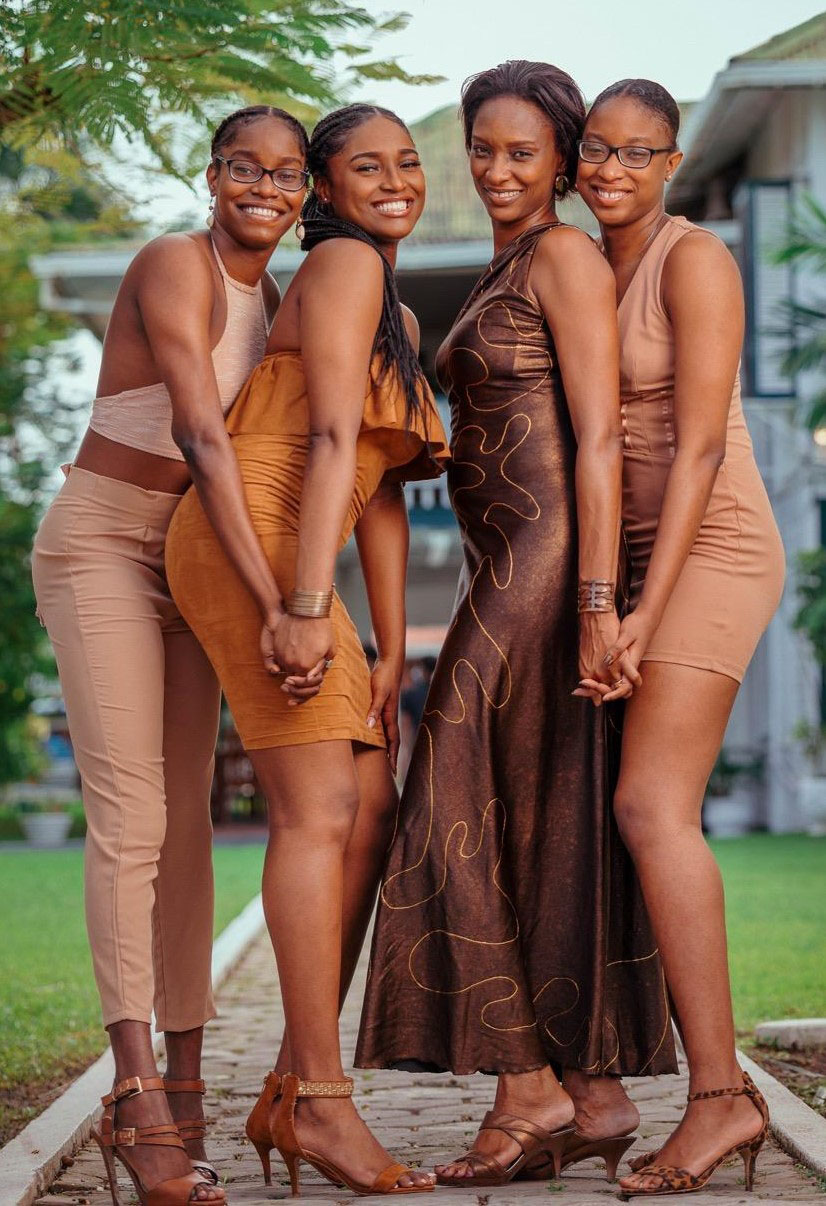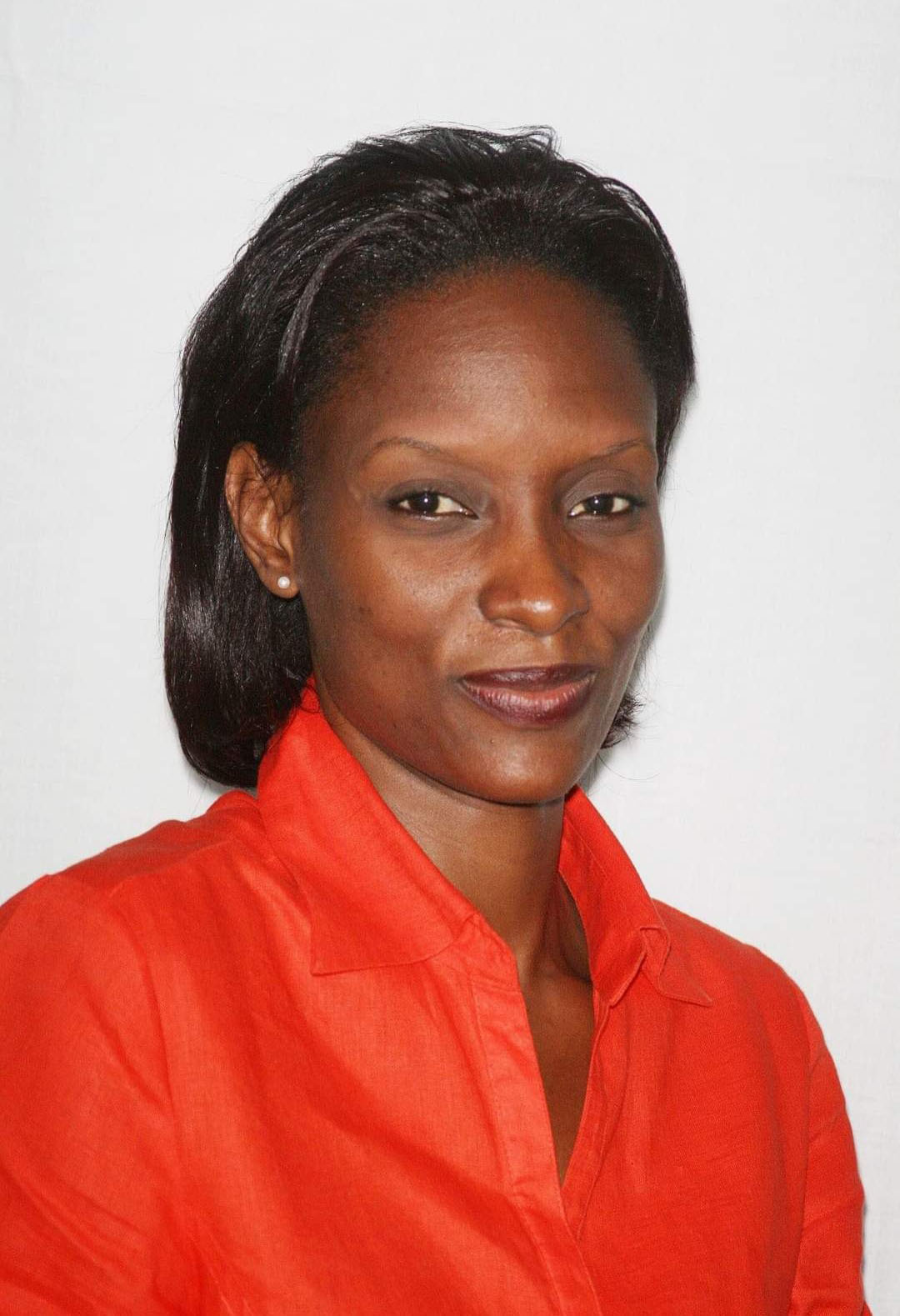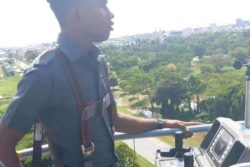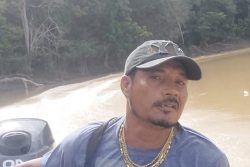By Miranda La Rose
Juggling motherhood and running a boutique hotel with her husband while trying to maintain its heritage steeped in the sugar industry were no mean feats for hotelier Dee George but she made them look easy.
“I’ve agreed to share my story not only as a working mother but to give hope to mothers that they too can simultaneously enjoy their children’s school life, their children’s extracurricular activities and be active participants in them while still earning an income and making a contribution to society,” George told Stabroek Weekend.
George is the president of the Tourism and Hospitality Association of Guyana, a board member of the Protected Areas Commission, a trustee of Uncle Eddie’s Home for senior citizens and a co-founder and director of Sispro Inc, an all-Guyanese, women-led company focused on exploring the energy sector.

“I don’t do things unless there is some pull that makes me feel I can make a worthwhile contribution and still experience some joy in what I do,” she said.
And while she is now engaged in many activities, George’s life still revolves around her three daughters and her baby – Herdmanston Lodge – which she and her husband, Michael, founded.
Her daughters, Onika and twins Danielle and Jadyn were all national swimmers who began swimming at about four years old.
Swim mom
Onika started swimming in 2002 at four years old. Herdmanston Lodge, the first of three properties acquired in the Herdmanston complex, came into operation in 2005, a year after the twins were born.
“I got up at 5.30 am to take Onika to swim practice and then took her to swimming in the afternoons after school. When the twins joined swimming and they became competitive swimmers, I took them to competitions at home and out of the country,” George said.
The children were members of Silver Sharks Swim Club and George became its secretary. She was also secretary for the Guyana Amateur Swimming Association for a period of time.
“At the same time, I was in the heat and belly of the hospitality business while our business grew. Honestly, sometimes I don’t know how I did it,” she recalled.
George also assisted swimmers to get home after practice.
“Once when dropping the children to town from Liliendaal, I saw something pitched out of the window. I pulled up at the side of the road and asked who threw something out of the window. I heard, ‘Auntie Dee, it was a banana skin. It is biodegradable.’ I said, ‘Go in that bush and get that thing.’ I said if everyone were to throw a banana skin out the window and said it was biodegradable, what do you suppose is going to happen?”

She continued. “Swimming and school consumed our life outside of the lodge. We took vacations out of the country when swim meets came up. We would take two days after the swim meet because we couldn’t afford to be away from the business for too long.”
Onika and the twins also played the piano and took dancing classes. Onika loved to sing.
When the twins were in first form at Queen’s College, George picked up Onika at the Bishops’ High School (BHS) then went for the girls. It was a busy and sometimes tiring routine for her.
“They were all swimming competitively so I suggested Michael and I do the morning runs with swimming and school and the driver to pick them up in the afternoons after school and take them to swimming,” she recalled. “Danielle objected. She asked, ‘Who is going to ask us how our day went?’”
George said Danielle’s objection made her think and she decided to keep on picking up the girls and listening to their stories.
“Clearly driving was our role as parents,” she said. “When I dropped them off at the pool in the mornings, I returned home, packed their breakfast and sometimes lunch and returned to the pool where they ate and combed their hair. In the afternoons, it was swim practice again and homework. Sometimes they did their homework at the pool. That was the drill that became a habit but the benefits, I don’t regret it one bit in spite of the bickering among clubs at GASA level. I saw the level of discipline they acquired and other benefits in all of my children.”
George said that when the children say, “‘Thank you, mom. We know it wasn’t easy for you but we are so happy you did it for us,’ it is a real satisfactory feeling of happiness knowing that we did the right thing.”
Apart from getting involved in the administrative business of the swim club and association, George took part in time-keeping or in recording times. “It was fun and rewarding to be there,” she said.
Children’s rights
However, it was not always easy at school, George said. While Onika was at BHS her form teacher asked her why her hair was always wet in the morning. Then, once when her work dipped, the form teacher told her she had to decide whether academics or extracurricular activity was more important.
George said she told the headmistress that both academics and extracurricular activity go hand in hand and that Onika was not going to drop swimming.
“At the time I was encouraging her to use her height in swimming to her advantage and to not let anyone tell her that she was too tall so she was not to feel insecure. I had adopted a poor posture because of my height. I didn’t want her to have insecurity issues because of her height and here was this teacher messing with it,” she said.
The headmistress subsequently asked George to assist in their orientation with parents and students at the opening of school to understand and balance children’s academics and extracurricular activities.
George also recalled an issue in grade three in primary school where Onika memorised some lines to ensure she could have taken part in a rights of the child show put on by then first lady Varshnie Jagdeo and UNICEF. Onika then was told she could not be part of the lineup because she was too tall. “I marched down to the first lady’s office in Hadfield Street and told her, ‘A child has the right to participate regardless of his or her height,’” George recalled. “I had gone to the school first and complained and I was not satisfied with the response. I couldn’t stand by the wayside and let them discriminate against her because of her height. The long and short of it was that Onika was in the show.”
By the time the twins continued their schooling in the US, the Georges in 2013, had acquired Herdmanston House, the adjoining property to Herdmanston Lodge.
George took time off during the entire remodelling of Herdmanston House and her father who had retired from the Guyana Sugar Corporation (GuySuCo) was appointed project manager to oversee the exercise. On completion of the project, he was appointed the general manager while she assumed the role of consultant and a director.
“I left Guyana to be with the children. I had my sister there who helped while I returned home occasionally to check on things,” she said.
In the US, Onika represented Baruch College in swimming. “By the time Onika left Guyana for university, had it not been for these swim meets, her comfort level would have been a whole different scenario. She was so confident about going off to university that she sublet her apartment with three other girls.” Today, Onika, who represented Guyana at the Commonwealth Games in Glasgow in the UK and at the FINA youth meet in Qatar, is a financial analyst with Goldman Sachs.
Meanwhile, the twins joined the Asphalt Green Unified swim team in New York. “Schooling fitted in and once again swimming became their anchor. The swimming fraternity has its own language and once you can speak it you are accepted and you run with it,” George said. And once again, she played her role with the swim club as she did in Guyana. “The twins also adapted well. They viewed their university education like meet preparation.”
The girls are at separate universities. One is in Pennsylvania and the other is in Connecticut. Danielle is doing economics and Jadyn is studying French.
Her children also return to Guyana for the Christmas and summer holidays during which time George takes them to different places in the country. They have travelled to different areas Berbice, Lethem, Mabaruma and Kaieteur Falls among other places. Their next destination is to the Pomeroon River and the Moruca sub-region. The twins are also looking to do internships in Guyana before they graduate with their bachelor’s degrees.
George also tries to keep her daughters connected with their Guyanese friends. “Once the distance starts to form, there is no fallback position and they will start making excuses like ‘I don’t have any friends in Guyana’,” she noted. She also encourages the twins to have their own friends so they do not feed off of each other.
Sugar cane nomad
Describing herself as a sugar cane nomad, George said her first home was at Wales sugar estate. She was five years old when her family moved to the Uitvlugt estate. She wrote the common entrance exam when the family lived at Albion estate. She started her secondary education at New Amsterdam Multilateral School but two weeks later her parents were transferred to Enmore sugar estate and so she was enrolled at the BHS in first form. While she was at BHS, her parents were subsequently transferred to LBI (La Bonne Intention).
After writing the General Certificate of Education Advanced level examinations she went on to the University of Guyana and obtained a bachelor’s degree in economics. While at UG she did a stint at the Canadian International Development Agency. After graduating she worked for four months at Courts (Guyana) but had to leave the job in 1998 due to a high-risk pregnancy.
She subsequently did a project with the Guyana Responsible Parenthood Association before she and her husband, a computer and electrical engineer started a small computer technology company in South Ruimveldt Park in 2000. In 2001 they started to acquire properties.
“That was the beginning of a property investment project. It was a time people were leaving Guyana in droves. We were running two things at the same time. We trained teachers in computer efficiency and things like that,” she said.
Running their own businesses meant that George worked from home and was able to be with her daughter.
When she became pregnant with the twins, again the pregnancy was high-risk. The twins were born in 2003. However, two and half months before they were born, the computer centre was burglarised. It was disbanded and the Georges placed all their focus on the property management company.
It was through the property management company that the Georges acquired the colonial style building at Peter Rose and Anira streets in Queenstown. It previously operated as Queenstown Inn.
Initially George said, “Nope” to the offer to buy the place because they were a young family and such a business would be 24/7. After some persuasion the Georges bought the seven-bedroom building.
On acquiring the place George called up the chairman of Guysuco, Errol Hanoman, who was one of the uncles in the sugar industry at the time and told him they wanted to name their business Herdmanston Lodge because of its historical connection to Herdmanston House on Peter Rose and Lamaha streets.
“Being a sugar cane kid, it was significant for me. At one time the chairman of Booker’s Holdings lived in the lodge,” she noted. Before the day was out Hanoman told her there was no objection and so Herdmanston Lodge was born in March 2005.
The Georges started the business by treating all guests as family members in keeping with Guyana’s tradition of hospitality.
The Herdmanstons
In 2009, Herdmanston House, the adjoining property owned by GuySuCo, was on the market, and they bought it.
“Herdmanston House was reconnected with Herdmanston Lodge. In acquiring Herdmanston House we learnt there was Herdmanston Annexe on Lamaha Street, the property west of Herdmanston House. Little did we know that down the road we were also going to acquire it. Now all the Herdmanston buildings have been reconnected under the Herdmanston Lodge brand. Internally we refer to them as HL, HH and the Annexe. The Annexe is not yet developed,” she said.
The idea of acquiring Herdmanston House represented heritage for George. “Only the sugar family could understand that. You see your parents heading off to Herdmanston House for a meeting. They didn’t know if they were going to be fired or promoted. There was that anxiety. Christmas time you knew it was Christmas social,” she said.
Herdmanston House took on a different meaning for George with the signing of the Herdmanston Accord in 1998 between then president Desmond Hoyte and Mrs Janet Jagan after post-elections protests erupted.
The Georges subsequently learned that heads of state and other visiting dignitaries also stayed at Herdmanston House. The rooms are named after present and past sugar estates and are geographically aligned to either the Demerara or Berbice Wings.
“The idea was to tell the story of sugar and the memory of GuySuCo in that space and to ensure its history is preserved. The original building had ship windows so we asked the architect to maintain that,” she stated. Sugar cane is also planted in the compound.
George related several anecdotes about guests wanting to stay in particular rooms because of where they came from. Some people assigned to the Uitvlugt room say they are staying in the U room because they do not know how to pronounce the word. People see the name Palmyra, knowing it is a village but not knowing it was a former sugar estate.
“Another laughing point is the Bath room. People would ask if that is where the bathroom is, not knowing of Bath Estate,” she revealed. “Other areas are the Yellow Crystal meeting room, so named because Guyana was the only country in the region that produced the yellow sugar crystals. Another area is the Mill Dock Patio, an area for relaxation named for the mill docks on the estates where workers went to lime when there was no grinding or something was off on the estates. In every name, we are telling the story of what sugar meant to Guyana before present day.”








